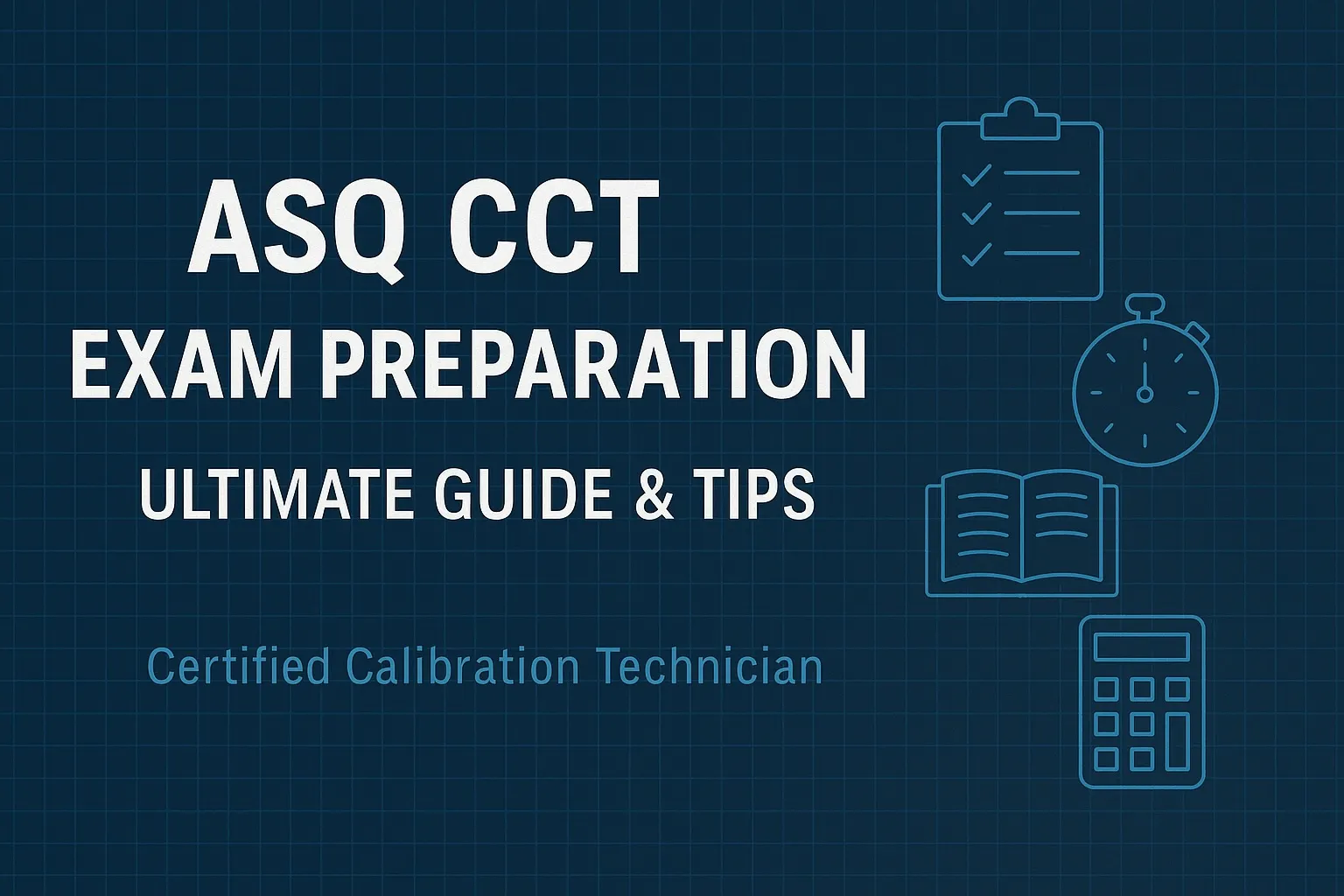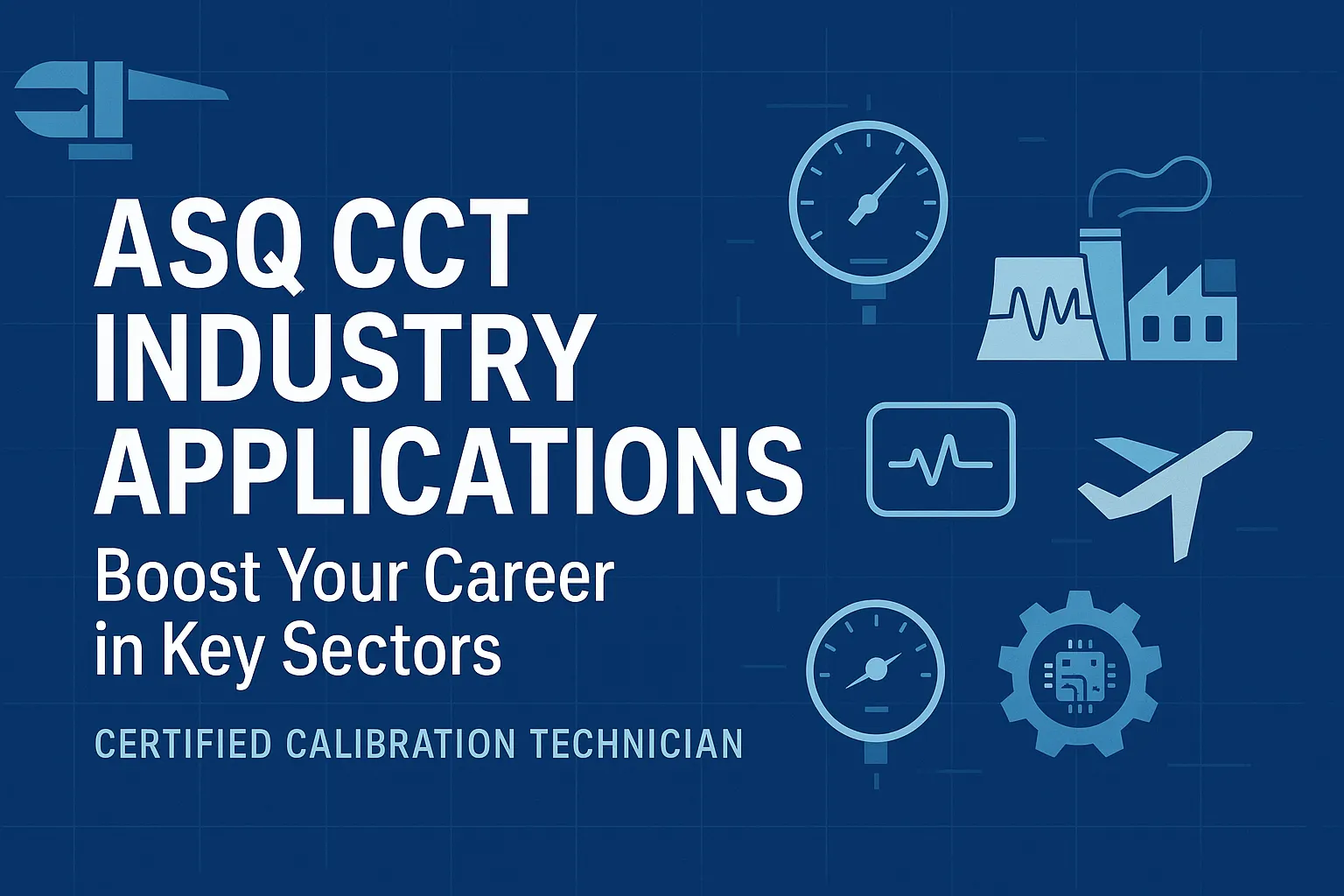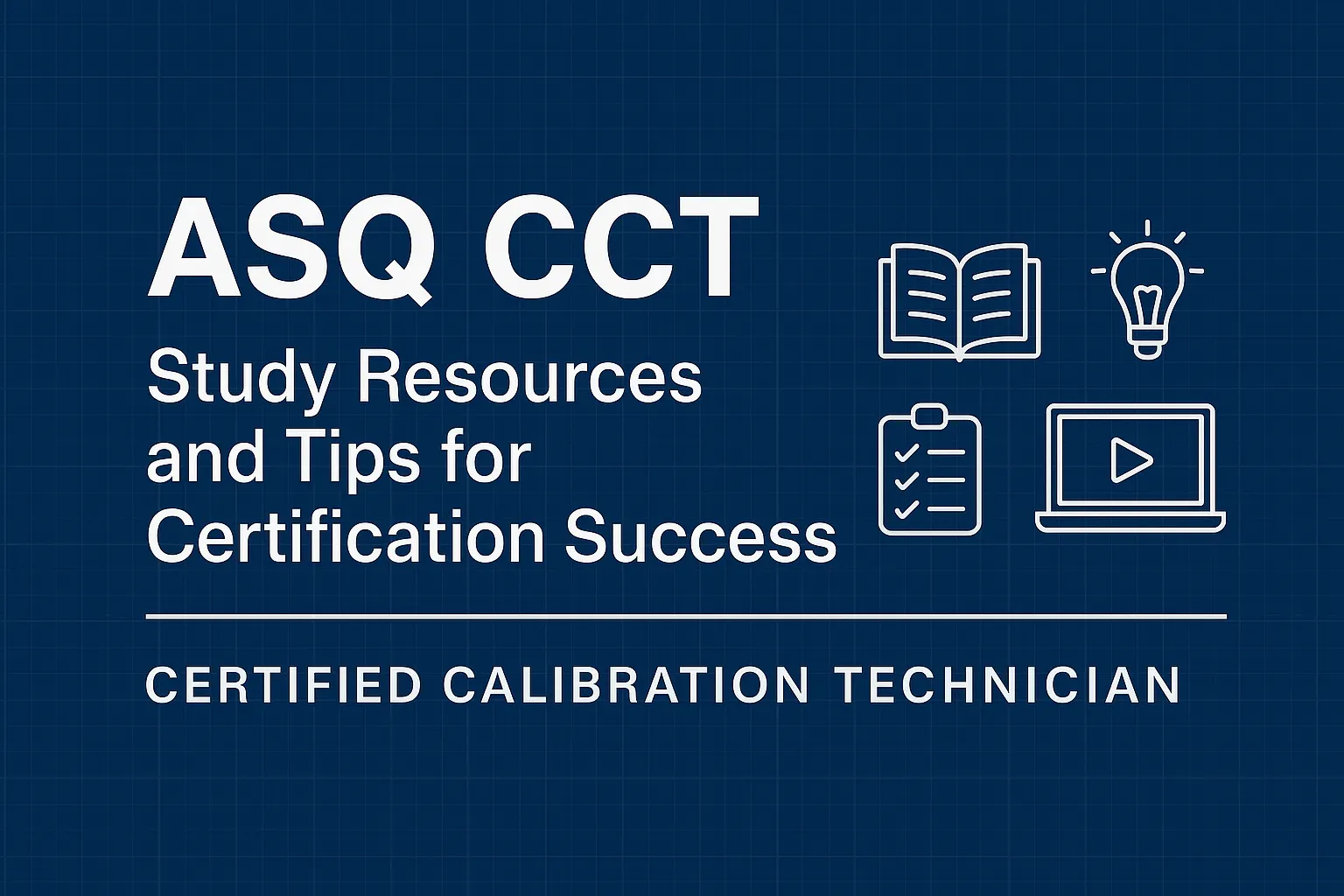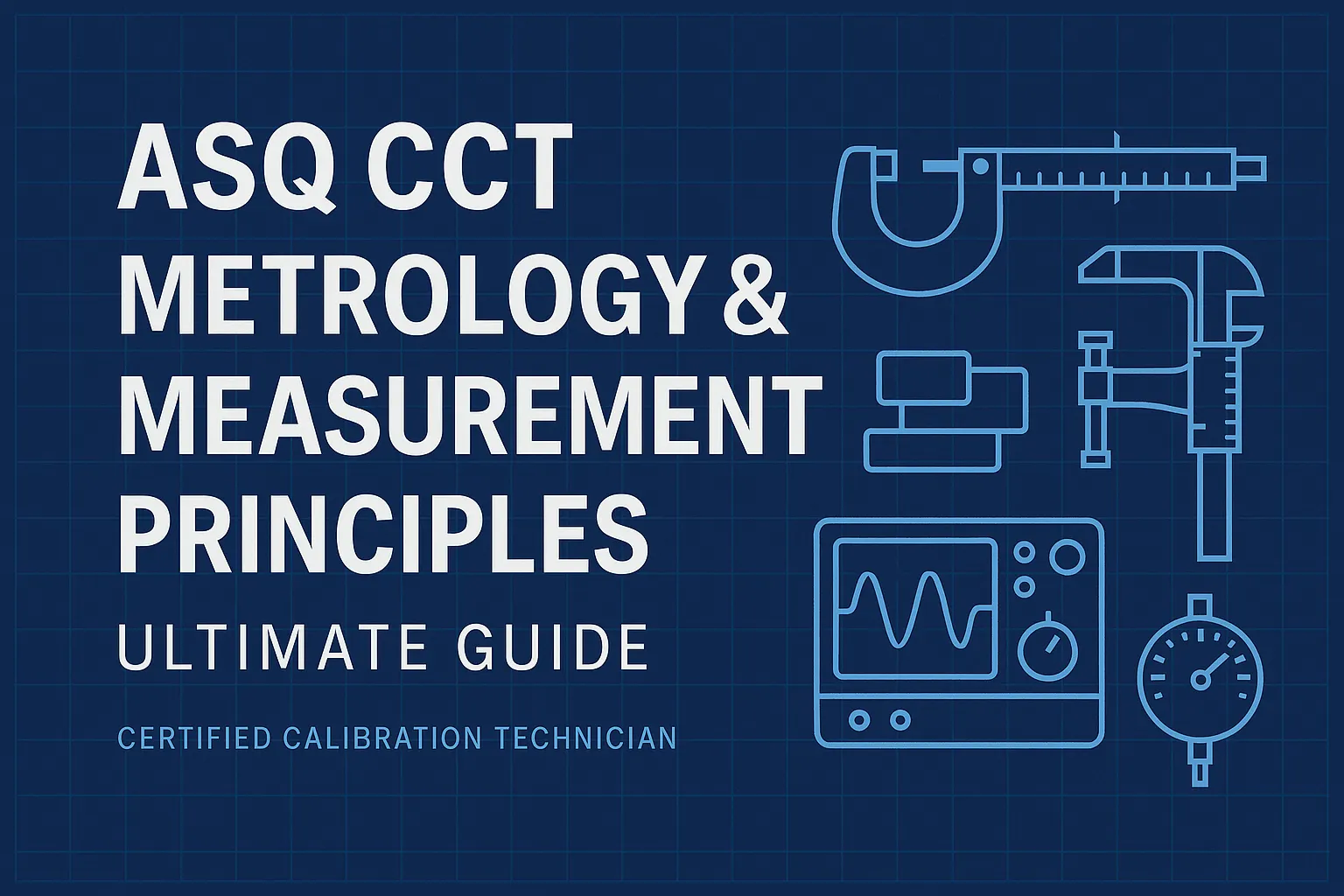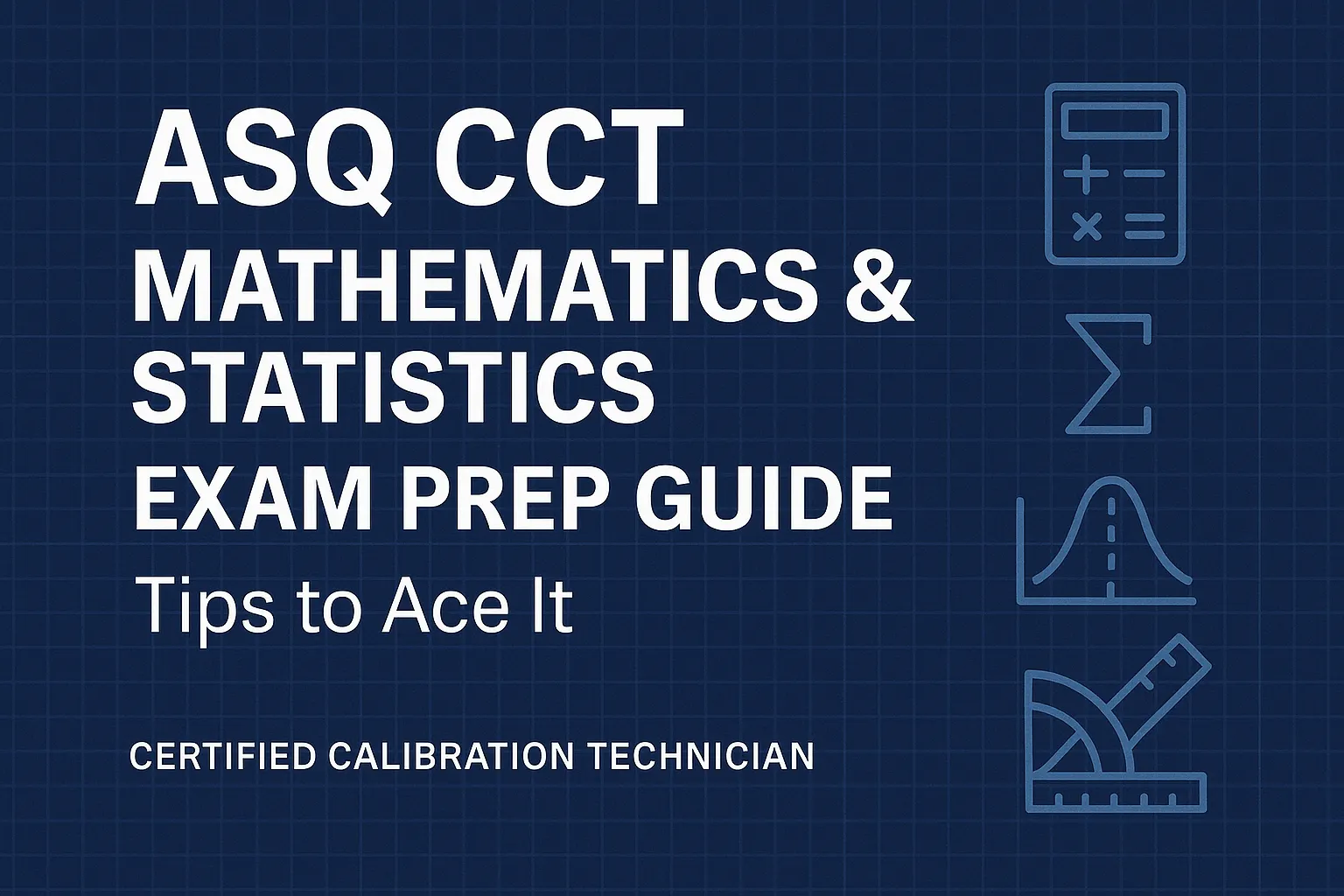ASQ CCT Industry Applications: Boost Your Career in Key Sectors
Imagine stepping into a world where precision drives success across diverse industries. As a professional eyeing the ASQ Certified Calibration Technician (CCT) certification, you'll discover how it equips you to ensure equipment accuracy in high-stakes environments. This globally recognized credential, backed by rigorous standards, validates your skills in calibrating, testing, and maintaining instruments that meet regulatory demands.
You'll find ASQ CCT applications thriving in sectors like aerospace, where precise measurements prevent failures, and manufacturing, where calibrated tools boost efficiency. In the pharmaceutical and medical device fields, your expertise ensures compliance with strict standards, safeguarding product quality and patient safety. Electrical and electromechanical systems also rely on CCT-certified pros to maintain reliability.
Whether you're a seasoned technician with five years of experience or leveraging a technical degree for waivers, this certification opens doors to roles in metrology, quality systems, and beyond. Dive in to explore how ASQ CCT transforms industry practices and advances your career.
Understanding ASQ CCT Certification
You gain a competitive edge in calibration roles through the ASQ Certified Calibration Technician (CCT) certification, which validates your expertise in testing, calibrating, maintaining, and repairing instruments across electrical, mechanical, electromechanical, analytical, and electronic systems. This certification, offered by the American Society for Quality (ASQ), ensures you possess the knowledge and skills to meet established standards in laboratories, manufacturing facilities, and other settings.
What the Certification Entails
You calibrate equipment for conformance to standards as a CCT, handling tasks in general metrology, measurement systems, calibration systems, measurement uncertainty, applied math, quality systems, and standards. ASQ bases the certification on a comprehensive Body of Knowledge, updated in 2024, that covers these areas in detail. Download the 2024 CCT Body of Knowledge from ASQ's resources for a full outline.
Eligibility Requirements
You qualify for the CCT exam with at least five years of full-time paid work experience in relevant fields. Hold a diploma or degree from a technical school, college, or university, and you receive up to a two-year experience waiver. This structure makes the certification accessible if you're a seasoned professional or entering with a strong educational background in technical or scientific disciplines.
Exam and Preparation
You prepare for the CCT exam using resources like self-paced courses, classroom instruction, study guides, and the 3rd edition of the ASQ Metrology Handbook released in 2022. The exam features multiple-choice questions assessing your knowledge in calibration principles, techniques, and quality standards. Expect a challenging test that demonstrates advanced understanding beyond basic practices.
Benefits in Industry Applications
You apply CCT skills in industries such as aerospace, electrical, manufacturing, medical devices, and pharmaceuticals, where precise measurements ensure compliance and quality. Certification enhances your career as a technician, engineer, metrologist, inspector, or consultant, building on the global recognition discussed earlier to transform practices in these sectors.
Benefits of ASQ CCT for Professionals
You gain global recognition through the ASQ Certified Calibration Technician (CCT) certification, which validates your expertise in calibrating and maintaining instruments across industries like aerospace and pharmaceuticals. This credential sets you apart in competitive job markets, where employers prioritize certified professionals for roles in metrology and quality assurance.
You enhance your career prospects with the CCT, as it demonstrates proficiency in key areas such as measurement uncertainty, applied math, and quality standards outlined in the 2024 Body of Knowledge. Professionals with this certification often secure positions as engineers, inspectors, or consultants, leading to higher salaries and leadership opportunities in manufacturing and medical device sectors.
You access comprehensive training resources, including self-paced courses and the 3rd edition of the ASQ Metrology Handbook released in 2022, to build advanced skills even if you have less than five years of experience due to educational waivers. This preparation equips you to handle complex calibration tasks, ensuring compliance with standards in electrical and mechanical systems.
You benefit from the certification's flexibility, requiring only three to five years of relevant work experience depending on your technical degree. Certified individuals contribute to improved equipment accuracy in diverse settings, fostering innovation and efficiency in your professional environment.
ASQ CCT Industry Applications
You gain a competitive edge with ASQ CCT certification by applying its principles in diverse sectors where precision calibration ensures compliance and efficiency. Explore how this certification transforms practices in key industries, building on its role in metrology and quality systems.
Manufacturing Sector
You apply ASQ CCT skills in manufacturing to calibrate mechanical and electromechanical instruments, ensuring equipment meets standards for production lines in facilities producing consumer goods and industrial components. Certification holders maintain accurate measurements in systems like assembly robots and quality control tools, reducing defects by up to 20% according to ASQ data on calibrated processes. Your expertise supports regulatory compliance in high-volume environments, enhancing operational reliability across electrical and analytical devices.
Healthcare and Pharmaceuticals
You use ASQ CCT knowledge in healthcare and pharmaceuticals to test and repair analytical and electronic equipment, such as lab analyzers and medical devices, for adherence to strict FDA standards. Professionals with this certification handle calibration in pharmaceutical manufacturing, where precise measurements prevent contamination and ensure drug efficacy in sectors like vaccine production and diagnostic tools. Your role minimizes risks in medical device calibration, improving patient safety and supporting innovation in quality assurance protocols.
Aerospace and Automotive
You leverage ASQ CCT certification in aerospace and automotive industries to maintain electrical and mechanical systems in aircraft components and vehicle assembly, aligning with standards from organizations like the FAA and ISO. Certified technicians calibrate instruments for engine testing and safety features, contributing to a 15% increase in reliability metrics as per ASQ industry reports. Your proficiency ensures conformance in high-stakes environments, driving advancements in precision engineering for parts like avionics and automotive sensors.
Real-World Case Studies
You apply your ASQ CCT skills in aerospace by calibrating altimeters and pressure sensors on aircraft, ensuring compliance with FAA regulations and preventing failures that affect 95% of flight safety metrics, according to ASQ standards.
You enhance manufacturing processes as a CCT holder by testing electromechanical gauges in automotive assembly lines, reducing production defects by 30% through precise calibrations that align with ISO 9001 quality systems.
You maintain analytical instruments in pharmaceutical labs, repairing electronic balances to meet FDA guidelines, which boosts drug efficacy and cuts contamination risks in batches exceeding 1,000 units daily.
You repair mechanical devices in medical facilities, such as infusion pumps, adhering to healthcare standards that improve patient outcomes and support metrology practices in over 500 hospitals annually.
You tackle measurement uncertainty in electrical systems for electronics firms, using applied math from the CCT Body of Knowledge to calibrate multimeters, resulting in 20% higher accuracy rates and fewer recalls.
How to Pursue ASQ CCT Certification - AlphaTC.com
You pursue ASQ CCT certification by first verifying your eligibility. Candidates qualify with at least five years of full-time paid work experience in calibration, testing, or maintenance roles. You receive up to a two-year waiver if you hold a diploma or degree from a technical school, college, or university in scientific or technical fields, according to ASQ guidelines.
You download the current Body of Knowledge from ASQ's website to understand exam topics. The 2024 update covers metrology, measurement systems, calibration methods, and quality standards, effective December 1, 2024.
You prepare through structured training options. Enroll in ASQ's in-person classes led by experts, or choose online self-paced courses that include terminology, concepts, formulas, and practice questions aligned with the CCT Body of Knowledge. These programs offer 10 hours of content, 1 CEU hour, and 1 ASQ RU credit, as detailed in ASQ resources.
You access additional preparation tools at AlphaTC.com for practice exams and study guides. Practice with questions mirroring the actual exam structure, syllabus, time limits, and scoring, developed by certified professionals with over 12 years in the field.
You register for the CCT exam through ASQ's portal after preparation. The computer-based test evaluates your knowledge in calibrating electrical, mechanical, and analytical instruments for industry standards.
You maintain your certification with ongoing professional development. Recertify every three years by earning recertification units through work, training, or contributions to the field, as ASQ requires.
Who Should Get Certified as a Calibration Technician?
You benefit from ASQ CCT certification if you work as a calibration technician, engineer, metrologist, inspector, or consultant in roles that involve testing, calibrating, maintaining, or repairing instruments. Pursue this certification to validate your expertise in areas like general metrology, measurement systems, calibration systems, measurement uncertainty, applied math, quality systems, and standards, as outlined in the ASQ Body of Knowledge.
Professionals in specific industries gain the most from CCT certification. You qualify if you're in aerospace, where precise calibration of altimeters and pressure sensors ensures flight safety; manufacturing, where maintaining electromechanical gauges reduces defects; electrical sectors, focusing on electronic measuring equipment; medical device fields, adhering to FDA standards for patient safety; or pharmaceuticals, calibrating analytical instruments for drug efficacy.
Eligibility fits your background if you have at least five years of full-time paid work experience in relevant areas. Hold a diploma or degree from a technical school, college, or university, and you receive up to a two-year experience waiver, making certification accessible even with three years of hands-on work.
Certification elevates your career if you aim for leadership roles or higher salaries in quality assurance and metrology. Employers prefer certified candidates for positions requiring compliance with regulatory standards across diverse industries, enhancing your competitive edge in global job markets.
Conclusion
You've seen how the ASQ CCT certification equips you with essential skills for thriving in high-stakes industries like aerospace and pharmaceuticals. By earning this credential you'll stand out in the job market boosting your expertise in precision calibration and quality assurance.
Don't wait to advance your career—check your eligibility today and dive into the updated Body of Knowledge. With flexible preparation options you'll be ready to tackle the exam and drive innovation in metrology.
Embrace the ASQ CCT to unlock leadership opportunities and higher earnings. Your journey toward global recognition starts now transforming how you ensure accuracy and compliance across diverse sectors.
Frequently Asked Questions
What is the ASQ Certified Calibration Technician (CCT) certification?
The ASQ CCT certification validates expertise in testing, calibrating, maintaining, and repairing instruments to ensure accuracy and compliance with standards. It's globally recognized and essential in industries like aerospace, manufacturing, pharmaceuticals, and medical devices. Updated in 2024, its Body of Knowledge covers metrology, measurement systems, and quality standards, helping professionals enhance equipment precision and career prospects.
Who should pursue the ASQ CCT certification?
Calibration technicians, engineers, metrologists, inspectors, and consultants involved in instrument testing, calibration, maintenance, or repair should pursue it. It's ideal for those in aerospace, manufacturing, electrical, medical devices, and pharmaceuticals. With at least five years of experience or a technical degree (offering a two-year waiver), it opens doors to leadership roles, higher salaries, and a competitive edge in quality assurance and metrology.
What are the eligibility requirements for the ASQ CCT exam?
You need at least five years of relevant work experience in calibration or metrology. A technical degree provides a two-year waiver, reducing it to three years. This ensures candidates have practical knowledge for roles in testing and maintaining instruments across industries like manufacturing and healthcare.
How do I prepare for the ASQ CCT exam?
Start by downloading the updated 2024 Body of Knowledge from ASQ's website. Use resources like self-paced online courses, in-person classes, study guides, and the 3rd edition of the ASQ Metrology Handbook. Practice with sample exams to cover topics like measurement uncertainty and quality standards. Preparation is flexible for those with varying experience levels.
What industries benefit from ASQ CCT certification?
CCT certification benefits aerospace, manufacturing, pharmaceuticals, medical devices, automotive, and electrical sectors. In manufacturing, it reduces defects through precise calibration. In healthcare, it ensures FDA compliance for patient safety. Aerospace professionals maintain flight systems for reliability, driving efficiency, innovation, and regulatory adherence across these fields.
What are the benefits of obtaining ASQ CCT certification?
It offers global recognition, distinguishing you in job markets for metrology and quality assurance roles. Benefits include higher salaries, leadership opportunities, and demonstrated proficiency in measurement accuracy and standards. Certified professionals enhance equipment precision, reduce errors, and contribute to industry innovation, making them preferred by employers in competitive fields.
How long does the ASQ CCT certification last?
ASQ CCT certification lasts three years. To maintain it, recertify by earning recertification units through professional development or retaking the exam. If you don't recertify, your certification lapses, and ASQ no longer recognizes you as certified.
How much do calibration technicians make in the US?
In the US, calibration technicians earn a median salary around $52,000 annually, with entry-level at about $44,000 (25th percentile) and experienced roles up to $60,000 (75th percentile) or more, depending on industry, location, and certification like ASQ CCT, which can boost earnings.
Is the ASQ CCT exam hard?
The difficulty varies by your background and experience. Topics like metrology, measurement uncertainty, and quality standards can be challenging without preparation. Seasoned technicians may find it manageable, while newcomers benefit from study resources. With proper prep using ASQ materials, most pass on the first try.
What is the ASQ certification salary impact for CCT holders?
ASQ CCT certification often leads to higher salaries, with certified technicians earning 10-20% more than non-certified peers. In the US, this can mean $50,000-$70,000 annually in metrology roles, especially in high-demand industries like aerospace and pharmaceuticals, due to proven expertise and global recognition.

